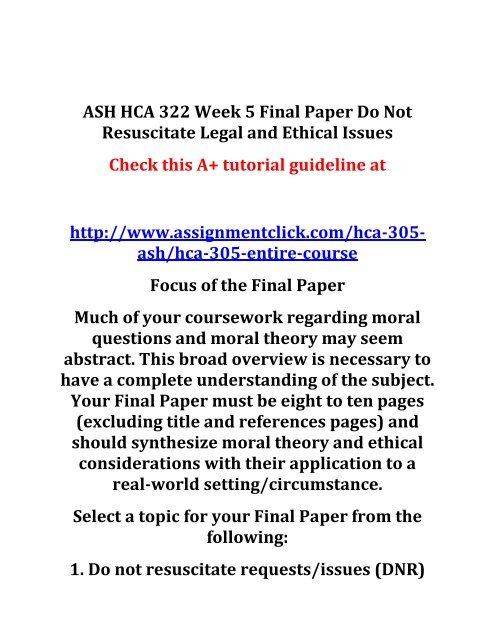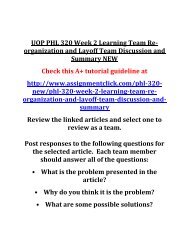ASH HCA 322 Week 5 Final Paper Do Not Resuscitate Legal and Ethical Issues
ash hca 322 week 5 dq 1 differences between informed consent and implied consent,ash hca 322 week 5 final paper do not resuscitate legal and ethical issues,ash hca 322,hca 322,ash hca 322 week 5 tutorial,hca 322 week 5 assignment,ash hca 322 week 5 help
ash hca 322 week 5 dq 1 differences between informed consent and implied consent,ash hca 322 week 5 final paper do not resuscitate legal and ethical issues,ash hca 322,hca 322,ash hca 322 week 5 tutorial,hca 322 week 5 assignment,ash hca 322 week 5 help
You also want an ePaper? Increase the reach of your titles
YUMPU automatically turns print PDFs into web optimized ePapers that Google loves.
<strong>ASH</strong> <strong>HCA</strong> <strong>322</strong> <strong>Week</strong> 5 <strong>Final</strong> <strong>Paper</strong> <strong>Do</strong> <strong>Not</strong><br />
<strong>Resuscitate</strong> <strong>Legal</strong> <strong>and</strong> <strong>Ethical</strong> <strong>Issues</strong><br />
Check this A+ tutorial guideline at<br />
http://www.assignmentclick.com/hca-305-<br />
ash/hca-305-entire-course<br />
Focus of the <strong>Final</strong> <strong>Paper</strong><br />
Much of your coursework regarding moral<br />
questions <strong>and</strong> moral theory may seem<br />
abstract. This broad overview is necessary to<br />
have a complete underst<strong>and</strong>ing of the subject.<br />
Your <strong>Final</strong> <strong>Paper</strong> must be eight to ten pages<br />
(excluding title <strong>and</strong> references pages) <strong>and</strong><br />
should synthesize moral theory <strong>and</strong> ethical<br />
considerations with their application to a<br />
real-world setting/circumstance.<br />
Select a topic for your <strong>Final</strong> <strong>Paper</strong> from the<br />
following:<br />
1. <strong>Do</strong> not resuscitate requests/issues (DNR)
2. Surrogacy<br />
3. Wrongful conception<br />
4. Organ donation<br />
5. Stem cell research<br />
6. Informed consent<br />
7. Assisted suicide<br />
8. Practices specific to diverse cultural<br />
contexts<br />
9. Your own topic, with instructor approval<br />
Your <strong>Final</strong> <strong>Paper</strong> must include the following<br />
regarding your chosen topic:<br />
1. Identify a legal/ethical issue or dilemma<br />
within your topic.<br />
2. Provide the history of the issue or dilemma.<br />
3. Present current resources to address the<br />
issue or dilemma.<br />
4. Evaluate alternative or better solutions for<br />
the issue or dilemma addressed.
5. Analyze the potential effects of this issue<br />
<strong>and</strong> predict how they may be addressed in the<br />
future.<br />
Additionally, you must address at least three<br />
of the course learning outcomes as they apply<br />
to your selected topic. For example, you could<br />
address the Patient’s Bill of Rights as it<br />
pertains to a do-not-resuscitate (DNR) order.<br />
Or, you could discuss the elements of<br />
autonomy, fidelity, <strong>and</strong> confidentiality as they<br />
are incorporated in the ethics of organ<br />
donation. The three outcomes you select must<br />
be explained in relation to your selected topic.<br />
The course learning outcomes are as follows:<br />
1. Analyze the evolution <strong>and</strong> application of<br />
moral theory <strong>and</strong> ethical principles in health<br />
care.<br />
2. Discuss the elements of autonomy, fidelity<br />
<strong>and</strong> confidentiality.<br />
3. Explain the legal rights of individuals as<br />
they interact with health care services.
4. Explain the process, including cultural<br />
diversity, for ethical decision making.<br />
5. Analyze the monitoring systems that ensure<br />
human rights, legal aspects, <strong>and</strong> quality health<br />
care.<br />
6. Discuss the implications of the Patient’s Bill<br />
of Rights.<br />
7. Analyze selected ethical <strong>and</strong> legal case<br />
studies that have promulgated precedentsetting<br />
decisions.<br />
You must utilize at least eight to ten scholarly<br />
<strong>and</strong>/or peer-reviewed sources that were<br />
published within the past five years (not<br />
including the textbook). You may also<br />
supplement your paper with interviews of<br />
agency personnel, comparisons of similar<br />
governmental agencies in varying<br />
communities or service populations, updates<br />
on current legislative initiatives in the area,<br />
<strong>and</strong> ethical analyses of the issues <strong>and</strong> services<br />
involved with the current situation(s)<br />
analyzed.
For more classes visit<br />
www.assignmentclick.com

















